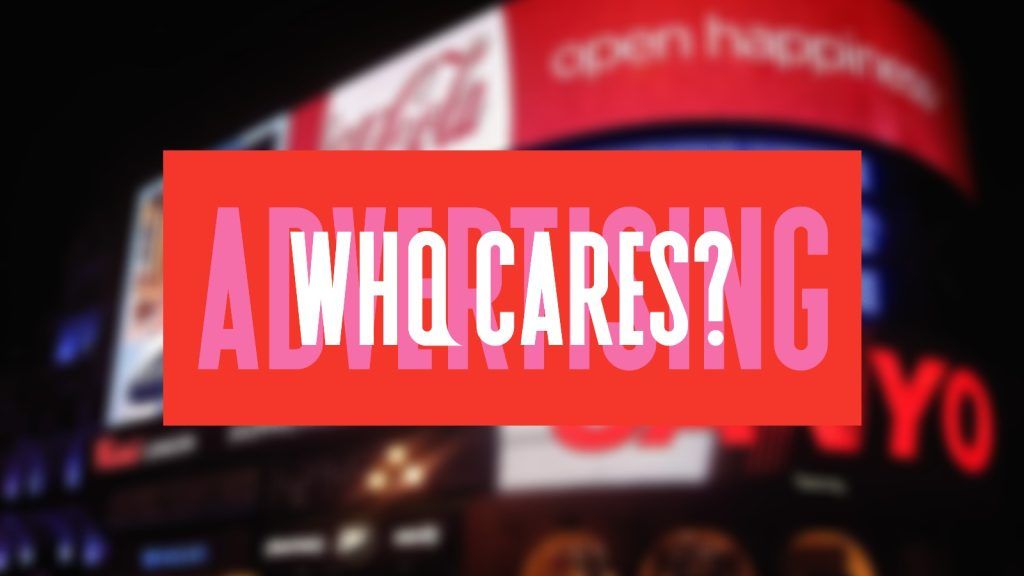The sausage factory: Tackling the issues
facing adland

Earlier this month more than 200 leaders from the advertising world came together in London to discuss, debate and deal with the current multiple issues facing adland.
Julia Linehan, CEO of The Digital Voice and founding advisor of industry brand safety coalition, UKSAFC, reflects on the inaugural Advertising: Who Cares? event, which offered a no holds barred look into the biggest challenges facing the multi-billion pound industry sector …
So many of The Digital Voice’s clients exist to make advertising better that when an event comes along like Advertising: Who Cares? that shares many of the same values as our clients’, we just have to get involved.
The event, the brainchild of ad industry veterans Brian Jacobs and Nick Manning, brought together just under 200 brands, agencies, publishers and adtech experts to look at what’s wrong with advertising and how the industry can set about mending it.
The day itself was the culmination of months spent looking at key issues through a number of workstreams, led by the principal speakers at the event: Michael Farmer (who addressed business models); Jenny Biggam (trading, transparency and trust); Denise Turner (measurement and accountability); Crispin Reed (recruitment and wellbeing); and Ruben Schreurs (brands and journalism).
Here’s what came out of it:
Being dull is expensive
Lucy Jameson, founder of Uncommon Creative Studio, warned that our instinct to follow the herd has resulted in “an epidemic of junk ads”.
“Evolution teaches us that following the herd is the safe option,” she said – the result being that “people are paying money to avoid what we spend our lives making”.
Most of what the ad industry produces is just dull, she said, adding that marketing legends Peter Field and Adam Morgan had put a value on dullness, calculating that if you produce dull advertising, you have to spend £10m more to get the same impact as a brand producing memorable advertising.
To get out of the rut, she said, brands need to identify what problem they fix, quoting Spotify’s Daniel Ek: “The value of a company is the sum of the problems it solves”.
Nice industry – shame about the business model and the leadership
Author and consultant Michael Farmer told delegates that the industry has everything it needs to succeed except the right business model and the leadership to change it.
An obsession with share price among the big six holding companies and advertisers, he noted, has created an ongoing need to accelerate growth and maintain high C-suite salaries.
As a result, advertisers have consistently cut the price they pay agencies for 30 years, while vastly increasing scopes of work, forcing agencies to downsize while creating more output for less money.
The number of pieces of work produced each year by a creative in a given agency has risen from three in 1983, to 11 in 2010, to 311 in 2019, he pointed out.
“Creative work is being cranked out like a sausage factory, and agencies are not pushing back for fear of losing the client,” he said.
Money is leaving the industry in all the wrong directions
Jenny Biggam, founder and CEO of independent media agency the7stars, echoed Michael Farmer’s point that agencies are not paid enough, based on an analysis of the number of people employed by the top 15 media agencies and the billings they look after.
Biggam told delegates that no one involved in her workstream discussions was happy with the status quo, and pointed to a loss of trust between advertisers and media agencies.
She also called out ad fraud as a major issue, citing the US-based Association of National Advertisers’ estimate that £200bn is being lost to ad fraud annually, with 27% of ad spend going to Made for Advertising sites.
The solution, she said, is around KPIs and making sure we don’t just chase eyeballs without thinking about context. “Advertisers and agencies need to redefine how they build a trusted relationship,” she concluded.
Measurement shouldn’t be an afterthought
In her ‘Measurement Manifesto’, Denise Turner, CEO of Route Research, said that measurement should be a forethought, not an afterthought, and that people should have clarity on what is being evaluated.
While the principles of measurement have not changed, she suggested, practices have, and education around measurement is urgently required.
“Know that we market to people, not devices or platforms; have sight of the sources of data and why they have been collected; and use the past to inform the future,” she advised delegates.
Who wants a job? Anyone…?
Four themes emerged from the study speaker Crispin Reed, founder of Skyscraper Consulting, conducted with students, academics and career specialists on the advertising industry’s recruitment problem: money, morality, imagination and marketing.
Money was a big priority for the student interviewees, who invariably have student debt to contend with.
For many, the civil service trumps advertising as a safer, more secure career choice, while salaries for graduate starters in advertising are simply not competitive with sectors such as law.
Meanwhile, interview transcripts also revealed advertising’s poor moral standing in the eyes of the young. One example: “It’s an intrusion in my privacy – it’s all about profit.”
Interviewees also complained of a lack of imagination in advertising, as well as the industry’s failure to market itself to students.
“Ad agencies don’t visit universities and UCAS doesn’t flag advertising on their list of prestigious jobs,” Crispin told delegates.
Don’t be scared of bad news
Ruben Schreurs, CSO of Ebiquity, in conversation with Hardeep Matharu, founder and editor of Byline Times, argued the case for the importance of quality journalism and slammed the idea that advertising alongside news, even bad news, could be considered unsafe.
“We have always advertised against hard news, and it is never un-brand safe to advertise against it, but over the last five to ten years, many advertisers have moved away from it,” Schreurs told delegates.
“News has lost its appeal to advertisers and agencies.” He went on to explain how his workstream had assembled a compendium of 21 pieces of evidence to support the statement: “News is brand-safe and effective”
Less rubbish and more creative can still save us
Esteemed ad-world gentlemen David Wheldon, former chief communications & marketing officer at RBS, and Sir John Hegarty, co-founder of BBH London and subsequently of The Garage, Soho, provided a clear-eyed prescription for change to conclude the conference.
Wheldon pointed out that, according to WFA, for every $100 spent on digital marketing, only $27 gets to where it should do.
In the same vein, Sir John noted that, of more than $750bn brands spent on advertising last year, only 6% is estimated to have been truly effective.
“The industry is pumping out more and more rubbish, and the planet cannot support it, the data centres you will need,” said Hegarty.
“Let’s talk about rephrasing the creative industry as a green industry. Good work requires less money because it creates word of mouth, so it is more sustainable.
“Trust is difficult to build, easy to lose. We have lost it because we haven’t taken leadership. It will be creativity that brings us back. Creativity will drive this industry.”
Also published in: Mediashotz



